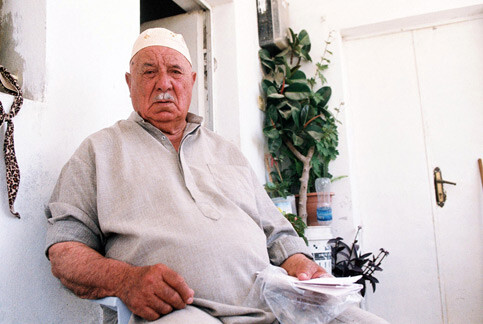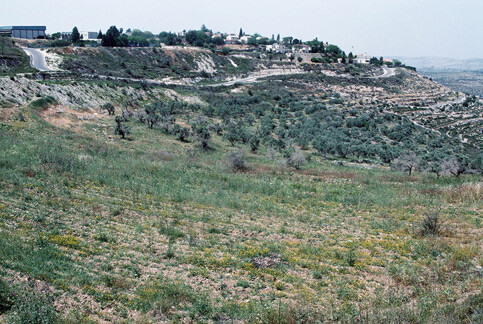The Electronic Intifada 27 April 2008

Jamil Khader, 87 years old, became very will when he discovered that nearly all of the 1,400 olive trees his extended family planted in February had suddenly gone missing. (Shabtai Gold/IRIN)
JEET, WEST BANK, 27 April (IRIN) - It was difficult for 87-year-old Jamil Khader to discover that nearly all of the 1,400 olive trees his extended family planted in February had suddenly gone missing, having been uprooted and stolen.
“He became very ill when I told him. He was hospitalized and was in bed for a week,” his son Khalil, from the small town of Jeet in the northern West Bank, told IRIN.
The family reckon that the trees were uprooted in March but they did not find out about it until 16 April, when they got to the land, which they do not do regularly because of its proximity to the nearby Israeli settlement of Kedumim.
“We only go to work the land in coordination with the [Israeli] military. I am afraid to go alone, as the settlers have pulled guns on me in the past,” Khalil said.
The family and aid workers blamed settlers from Kedumim for the missing trees.
“There have been many violent incidents against Palestinians in that area of the West Bank,” said Emily Schaefer, a lawyer from the Israeli rights group Yesh Din, which specializes in such cases.
“In the three years we have been operating, not a single [Israeli] was convicted for uprooting or damaging Palestinian olive trees,” she said, noting that from her research she was doubtful anyone had ever been brought to justice by the Israeli authorities for such crimes.
Jamil was born in Nazereth, in what is now Israel, in 1922. During the spring of 1948 his family became refugees.
“We left Nazereth with nothing at all,” he said, retelling his life as a policeman with the British during World War II, a soldier with the Arab armies in 1948 and later as a police officer with the Jordanians when they ruled the West Bank.
The last job gave him enough money to purchase the plot of land near Nablus, which has become the family’s most important possession. They, like others, have become increasingly dependent on agriculture for their livelihood as harsh restrictions on movement have cut them off from their former jobs as laborers inside Israel.

In the foreground is the land where Khader’s trees were planted and then uprooted, in the background lies the Israeli settlement of Kedumim. (Shabtai Gold/IRIN)
Reliant on agriculture
“I am completely reliant on agriculture; I don’t have any other work,” said Khalil, who is also registered with UNRWA, the UN agency for Palestinian refugees.
“The olive trees and the other products from the land help support my family and my brothers and their children.”
With the local economy faltering, aid agencies had stepped in and tried to help: Of the missing trees, 1,000 had been donated by the International Committee of the Red Cross (ICRC) which said Jeet and the neighboring villages were especially vulnerable due to their limited land access and proximity to Israeli settlements.
“It is very disturbing to see that the farmers yet again have had their trees uprooted. Unfortunately it proves how difficult daily life is for these people,” Helge Kvam, a spokesman for the ICRC in Jerusalem, told IRIN.
This was, in fact, the fourth time in a decade that the village’s agriculture had been attacked. In the 1990s arsonists burnt down many hectares of olive trees. In 2005 another wave of violence destroyed most of the remaining trees.
In 2007 the Israeli Rabbis for Human Rights purchased and planted some 500 olive trees, hoping to improve the local economy. But over the following four months nearly all those trees were destroyed or uprooted and taken away.
With the ICRC donation now missing, residents feel at a loss and do not know if it will be possible to continue counting on agriculture as a source of livelihood, which was their fallback option.
In response to the incident, the Israeli military said it fell under the jurisdiction of the Civil Administration which in turn asked IRIN to contact the Israeli police. A police spokesman could only say that as the Palestinians had filed a complaint the case would be investigated, and suggested contacting the military.
This item comes to you via IRIN, a UN humanitarian news and information service, but may not necessarily reflect the views of the United Nations or its agencies. All IRIN material may be reposted or reprinted free-of-charge; refer to the copyright page for conditions of use. IRIN is a project of the UN Office for the Coordination of Humanitarian Affairs.
Related Links


